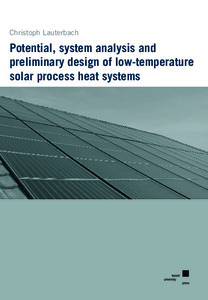| dc.date.accessioned | 2023-08-22T14:27:41Z | |
| dc.date.available | 2023-08-22T14:27:41Z | |
| dc.date.issued | 2014 | |
| dc.identifier | doi:10.17170/kobra-202308228664 | |
| dc.identifier.isbn | 978-3-86219-743-9 (e-book) | |
| dc.identifier.uri | urn:nbn:de:0002-37430 | |
| dc.identifier.uri | http://hdl.handle.net/123456789/15016 | |
| dc.description | Zugleich: Universität Kassel, Dissertation, 2014 | |
| dc.language.iso | eng | |
| dc.publisher | kassel university press | |
| dc.rights | Urheberrechtlich geschützt | |
| dc.rights.uri | https://rightsstatements.org/page/InC/1.0/ | |
| dc.subject.ddc | 620 | |
| dc.title | Potential, system analysis and preliminary design of low-temperature solar process heat systems | eng |
| dc.type | Buch | |
| dcterms.abstract | The industrial sector is very promising for the use of solar thermal technology, since it accounts for a large share of the total final energy consumption (e.g. 27 % in Germany in 2010) and it predominantly uses the consumed energy as thermal energy (74 % in Germany in 2010). In order to develop this area of application, it is necessary to understand which industrial sectors have the highest potential, which processes within these sectors are most suitable for the integration of solar heat as well as to quantify the possible contribution to the industrial heat demand. For this thesis, the industrial heat consumption in Germany is analyzed, which leads to the selection of the 11 most promising sectors within industry. These are Chemicals, Food and beverages, Motor vehicles, Paper, Fabricated metal, Machinery and equipment, Rubber and plastic, Electrical equipment, Textiles, Printing and Wood. The theoretical potential of solar heat for industrial processes below 300 °C in Germany adds up to 134 TWh per year, the technical potential (considering efficiency measures, limited roof area and a solar fraction) being 16 TWh per year or 3.4 % of the overall industrial heat demand. Solar thermal systems can achieve higher system yields in industrial applications compared to domestic ones. At the same time, systems can be more complex in industrial applications. In order to design and operate solar process heat systems efficiently and to exploit the large potential, possible faults of such systems and their impact have to be evaluated. In this thesis, an implemented solar process heat system is methodically analyzed based on measurements and simulations with a validated model. Several faults are identified and their influence, as well as the influence of a reduced load on the system yield is evaluated. The analysis shows that a reduced load is most influential. Further, the most important impact factors on the system performance are identified: the collector parameters (η0, a1) and load characteristics (mass flow, temperature). The design of solar process heat systems is in many cases very demanding, hence costly. This high effort is a major barrier for a further development of solar heat for industrial applications. The decision to install solar thermal systems is in most cases based on solar heat generation cost. Collector field and heat store size are the most important figures for the estimation of the overall cost of a solar thermal system. Therefore, a simple approach for dimensioning the collector field and heat store is developed in this thesis in order to enable manufacturers and planners on one hand and costumers on the other hand to make a decision in favor or against a solar process heat system. In addition to investment cost, the specific system yield, which is determined for selected process heat applications in this thesis, is necessary to calculate solar heat generation cost. Finally, indications on the necessary accuracy of the load profile are provided to help to reduce effort in the design phase. | eng |
| dcterms.accessRights | open access | |
| dcterms.creator | Lauterbach, Christoph | |
| dcterms.dateAccepted | 2014-02-28 | |
| dcterms.extent | X, 127 Seiten | |
| dc.contributor.corporatename | Kassel, Universität Kassel, Fachbereich Maschinenbau | |
| dc.contributor.referee | Vajen, Klaus (Prof. Dr.) | |
| dc.contributor.referee | Martínez Moll, Victor (Prof. Dr.) | |
| dc.contributor.referee | Jordan, Ulrike (Dr.) | |
| dc.contributor.referee | Knissel, Jens (Prof. Dr.) | |
| dc.publisher.place | Kassel | |
| dc.relation.isbn | 978-3-86219-742-2 (print) | |
| dc.subject.swd | Prozesswärme | ger |
| dc.subject.swd | Niedrigtemperatur | ger |
| dc.subject.swd | Thermische Solaranlage | ger |
| dc.subject.swd | Bemessung | ger |
| dc.type.version | publishedVersion | |
| kup.iskup | true | |
| kup.subject | Naturwissenschaft, Technik, Informatik, Medizin | |
| kup.typ | Dissertation | |
| kup.institution | FB 15 / Maschinenbau | |
| kup.binding | Softcover | |
| kup.size | 17 x 24 cm | |


